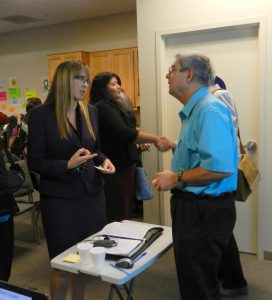
“It’s the dollars that get them,” said Douglas Dunn to an overflow crowd at Modesto’s Jana Lynn Room on North Ninth Street Wednesday night.
Dunn was explaining how he and other citizen activists convinced Contra Costa County Supervisors to enact Laura’s Law, a policy that enables families to require assistance for mentally ill relatives through a court order. Nearly one-hundred people had come to hear Dunn and Randall Hagar, Director of Government Affairs for the California Psychiatric Association, explain how to establish Laura’s Law in Stanislaus County.
Like many people in the room, Dunn and his wife had experienced years of torment trying to find effective assistance for a mentally ill family member. When Dunn used the Freedom of Information Act to access information about the expense of hospitalization and jail time for the seriously mentally ill, he was able to show that diversion into Assisted Outpatient Treatment programs was far more cost-effective.
Currently, in counties without Laura’s Law, at-risk mentally ill people are either jailed or put into short-term recovery programs that can last anywhere from three to ninety days. At the end of their jail time or program, they’re released.
Those with families go home to another round of refusal to take their prescribed medicines and potentially dangerous behavior. Those without families to take them in often (re)join the homeless population.
The endless cycles of incarceration and treatment are extremely expensive and almost never effective. Lonny Davis, who has fifty years’ experience housing and caring for the mentally ill, always adds that current treatments are also inhumane when people in need end up in jail or on the streets.
“We need to realize this is also about compassion,” says Davis frequently.
During a question and answer session, audience members emphasized the difficulty of dealing with family members who frequently seem in imminent danger of harming themselves or others. Despite the best efforts of family and friends, mentally ill people often “choose” homelessness, fall into drug use, and become less and less able to care for themselves.
Dunn and Hagar came with handouts that included detailed descriptions of what other counties have done to implement Laura’s Law, including cost-saving results. Dunn claimed that Contra Costa County saved two dollars for every dollar spent on court-ordered assisted treatment. The handouts included considerations for Stanislaus County.
Audience members included Ruben Imperial, the county’s Community Development and Empowerment Manager, Modesto City Councilmember Kristi Ah You, county mental health consultant Dr. Phil Trompetter, Kevin Carroll, director of the Modesto Gospel Mission, several City of Modesto police officers, and Frank Damrell, District Representative for State Senator Cathleen Galgiani.
“Laura’s Law is a small tool,” said Randall Hagar at the beginning of the meeting, holding his thumb and forefinger about an inch apart, but judging from the size and passion of the turn-away crowd, it’s a much needed tool.
